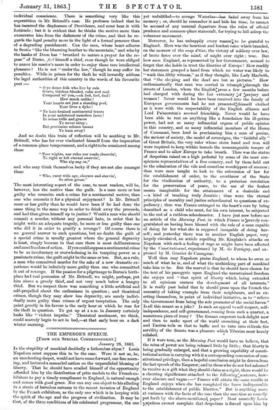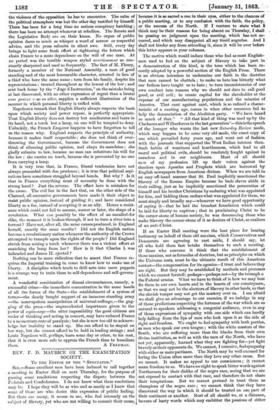THE EMPEROR'S SPEECH.
[FROM OUR SPECIAL CORRESPONDENT.]
January 28, 1863. Is• the stupidity of mankind decidedly a fathomless abyss? Louis Napoleon must suppose this to be the case. Were it not so, he, an unrelenting despot, would not have come forward, one fine morn- ing, and lectured a manacled nation on the unparalleled blessing of liberty. That he should have availed himself of the opportunity afforded him by the distribution of prize medals to the French ex- hibitors to pay a timely compliment to England, is natural enough and comes with good grace. Nor can any one object to his alluding in a strain of harmless sarcasm to the recent invasion of England by the French exhibitors, as the only one which is in keeping with the spirit of the age and the progress of civilization. It may be that, of the three conditions of his celebrated programme, the one
yet unfulfilled—to avenge Waterloo—has faded away from his memory ; or, should he remember it and bide his tune, he cannot be accused of any unusual departure from the rules of official prudence and common-place statecraft, for trying to lull asleep the volunteer movement.
Moreover, he has unhappily every reasons to be grateful to England. Hers was the heartiest and loudest voice which branded, on the morrow of the coup d'etat, the victory of soldiery over law, of brute force over the mind, of might over right ; true. But how soon England, as represented by her Government, seemed to forget that she holds in trust the liberties of Europe ! How readily her statesmen grasped a hand from which no water was likely to "wash this filthy witness," as if they thought, like Lady Macbeth, that " the sleeping and the dead are but as pictures." How enthusiastically that man was carried in triumph through the streets of London, whom the English: press a few months before had charged with daring the last extremity :',of :perjury and treason ! Never would he have been received into the family of European governments had he not presented,:thimself clothed as it were with the respectability of the English alliance and Lord Pahnerston's avowed friendship. Never would he have been able to rest on anything like a foundation his ill-gotten power, had not so many influential organs of public opinion in this country, and so many influential members of the House of Commons, been loud in proclaiming him a man of genius, the saviour of society, the model of sovereigns, the "faithful ally " of Great Britain, the very ruler whose stern hand and iron will were required to keep within bounds the unmanageable temper of France and to allow Europe to take breath. Thus was the statue of despotism raised on a high pedestal by some of the most con- spicuous representatives of a free country, and by them held out to the admiration of the vile and countless worshippers of success ; thus were men taught to look to the subversion of law for the establishment of order, to the overthrow of the State for the vindication of authority, to a pretorian revolution for the preservation of peace, to the use of the foulest means imaginable for the attainment of a desirable end —a kind of teaching truly Jesuitic ; thus were the eternal principles of morality and justice subordinated to questions of ex- pediency ; thus was France outraged to the heart's core by being described as a child who must, for his own interest, be subjected to the rod of a ruthless schoolmaster. I have just now before me an article of the Morning Post, in which France is :gravely con- gratulated on having been blessed with the rule of a man capable of doing for her what she is supposed incapable of doing her- self ; and yesterday there was in another English paper,' very largely circulated, an article repelling Mr. Kinglake's attacks on Napoleon with such a feeling of rage as might have been affected by the Constitutionnel, experienced by M. de Persigny, and ex- pressed by M. Granier de Cassagnac.
Well then may Napoleon praise England, to whom he owes so much of what he is, and of what the unthinking part of mankind take him to be. But the marvel is that he should have chosen for the text of his panegyric upon England the unrestrained freedom she enjoys and " that spirit of liberty which, being extended to all opinions ensures the development of all interests." It is really past belief that he should press upou the French the necessity of taking example from their . neighbours, and so ex- erting themselves, in point of individual initiative, as to "relieve the Government from being the sole promoter of the social forces." hall this meant as a joke? Is such an appeal to self-respect, self- independence, and self-government, coming from such a quarter, a monstrous piece of irony The Roman emperors took delight now and then to make sport of the world crouching at their feet, and Tacitus tells us that to baffle and to turn into ridicule the servility of the Senate was a pleasure which Tiberius most keenly relished.
If it were true, as the Morning Post would have us believe, that the reins of power are being released little by little; that liberty is being gradually enlarged, and that a growing capability of consti- tutional action is carrying with it a corresponding concession of con- stitutional privilege, then a hopeful conclusion might be drawn from the last speech of the Emperor; and to those who do not feel ashamed to receive as a gift what they should claim as a right, there would be a cheering significance attached to the following, sentence, how- ever obscure and vague :—" France will attain the same results as England enjoys when she has completed the bases indispensable to the establishment of public liberties." But is anything more at variance with the facts of the case than the assertion so roundly put forth by the above-mentioned, paper? Al ost assuredly Louis Napoleon cannot complain that despotism is forced upon him by
the violence of the opposition he has to encounter. The calm of the political atmosphere was but the other day testified by himself.
There has been for a long time no serious conspiracy hatching ; there has been no attempt whatever at rebellion. The Senate and the Legislative Body are on their knees. No organ of public opinion dares so much as whisper a word of sorrow or respectful advice, and the press submits in silent awe. Still, every day brings to light some fresh effort at tightening the fetters which chain France to a mute dependence on the will of one man. At no period was the terrible weapon styled avertissement so con- stantly sharpened and used so frequently. The fact of M. Fleury, formerly a member of the National Assembly, a man of good standing and of the most honourable character, arrested in lieu of a thief who bore the same name ; torn from his family, despite his representations ; treated throughout as the lowest of the low ; and sent back home by the " Juge d'Instruction," on the mistake being at last discovered, with no other expression of regret than a brutal roes pourez vms en alter, supplies a sufficient illustration of the manner in which personal liberty is trifled with.
Napoleon's remark that English liberty always respects the basis upon which society and power repose, is perfectly appropriate. That English liberty does not destroy but ameliorates and bears in its hand, not a torch but a lamp, no one will be tempted to deny. Unluckily, the French Emperor happens to have forgotten to tell us the reason why. England respects the principle of authority, because it makes itself respectable ; she does not think of over- throwing the Government, because the Government does not think of silencing public opinion, and obeys its mandates ; she gladly submits to law, because no man can substitute his will for the law ; she carries no torch, because she is prevented by no one from carrying a lamp.
It is very true that, in France, liberal tendencies have not always proceeded with due prudence ; it is true that political aspi- rations have sometimes straggled beyond bonds. But why ? Is it that in France everything must of necessity be done with the strong hand ? Just the reverse. The effect here is mistaken for the cause. The evil lies in the fact that, on the other side of the Channel, all successive governments have made it their object to resist public opinion, instead of guiding it ; and have considered liberty as a foe, instead of accepting it as an ally. Hence a resist- ance which could not fail to assume, sooner or later, the shape of a revolution. What can possibly be the effect of an uncalled-for dike, the moment it is broken through, if not to turn a river into a torrent ? Have not, after all, the same causes produced, in England herself, exactly the same results? Did not the English nation become a revolutionary nation whenever the authority of the Crown attempted to trample upon the rights of the people ? Did England shrink from seizing a torch whenever there was a violent effort at snatching the lamp from her? How is it that Charles I. was beheaded and James II. ejected 7 Nothing can be more ridiculous that to assert that France re- quires the Imperial training to come to know how to make use of liberty. A discipline which tends to drill men into mere puppets is a strange way to train them to self-dependence and self-govern- ment.
A wonderful combination of dismal circumstances, namely, a successful crime—the immediate concentration in the same hands of all the forces of the State—the establishment of a system of terror—the dearly bought support of an immense standing army —the unscrupulous manipulation of universal suffrage,—the gag- ging of the press—the unprecedented importance given to the power of espioenage—the utter impossibility the good citizens are under of thinking and acting in concert, may have reduced France to a momentarystate of paralysis ; but she is now too old to acknow- ledge her inability to stand up. She can afford to be stayed on her way, but she cannot afford to be held in leading strings ; and Louis Napoleon will, perhaps, learn some day or other, to his cost, that it is even more safe to oppress the French than to humiliate































 Previous page
Previous page